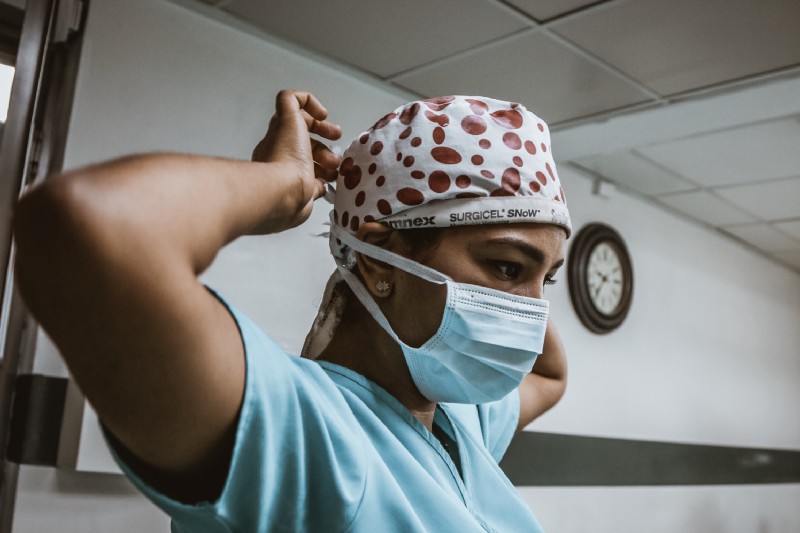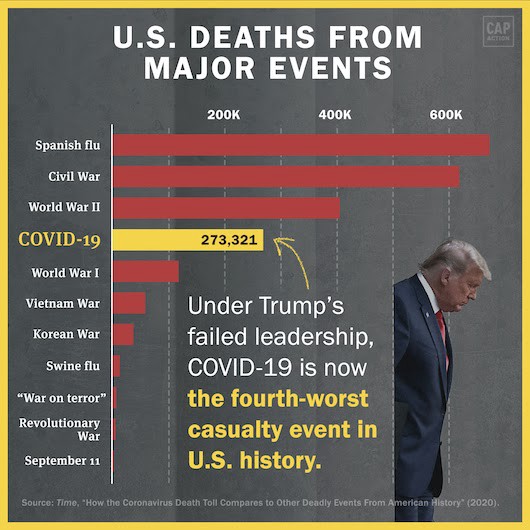This piece was originally published in the December 3, 2020 edition of CAP Action’s daily newsletter, the Progress Report. Subscribe to the Progress Report here.
 Photo by SJ Objio on Unsplash
Photo by SJ Objio on Unsplash
— Mitch McConnell, doing some gaslighting on the Senate floor today. He has blocked pandemic relief funds from getting to the American people for more than 200 days.
Trump has failed time and again to do anything to stop this pandemic. It’s now the fourth WORST casualty event in U.S. history.
Chaos has a price.
Share this on Twitter and Facebook to get the facts out:

The pandemic continues to break records as we get deeper and deeper into the winter months. And given that we’re just a week out from Thanksgiving, we likely haven’t seen the full impact of this most recent round of holiday travel and gatherings yet.
- In a report to governors over the weekend, the White House Coronavirus Task Force even acknowledged the dangers holiday travel posed to millions of Americans, writing that “you need to assume you became infected during the Thanksgiving period if you gathered beyond your immediate household.”
- America’s pandemic records just keep getting broken. On Wednesday, the United States tallied the most deaths in a single day since the start of the pandemic (2,804), surpassing the previous record high set in April by more than 200 deaths.
- Yesterday was also the first day in which the U.S. saw 200,000+ new confirmed cases and 100,000+ patients hospitalized for the coronavirus. Just to be clear, that second number related to hospitalizations isn’t for the entire duration of the pandemic — it’s the number of Americans who are currently in the hospital being treated for COVID-19.
- Although a vaccine is on the horizon, the reality is shaping up to be more complicated than you might think. Experts worry that some Americans may be hesitant to get a coronavirus vaccine, from certain demographic groups — 36% of Black Americans said in a recent survey that they are “not at all likely” to get vaccinated — to anti-vaxxers to a general public that’s been living in anxiety and uncertainty since March.
- In an attempt to preempt vaccine skepticism, former presidents Obama, Bush, and Clinton announced this week that they’d be willing to get their coronavirus vaccines on camera as a demonstration to sow public trust.
With public focus shifting to a coronavirus vaccine, experts and public officials are faced with determining who will get the vaccine and in what order. The Centers for Disease Control issued their official recommendation earlier this week that health care and nursing home workers receive top priority, with guidance on further tiers of second priority recipients to come later. But one question that has been met with conflicting reactions is the fate of incarcerated people.
- As we know, prisons and jails have been among the hardest hit environments by the pandemic. Incarcerated people are four times as likely to contract COVID-19 and twice as likely to die from it than the general population. It’s not unlike the outbreaks we’ve seen in nursing homes.
- So it might seem obvious to make vaccinating these folks a priority — if not because they have no option to leave and are dying in government custody, then because prison outbreaks often spread past the walls of the prison itself and infect people in the outside community. But it’s not as simple as that.
- In many states, incarcerated people are stripped of their right to vote, giving them very little political power and leaving it up to the compassion and interest of elected officials to determine whether they will be prioritized for the coronavirus vaccine at the level they need to be to save lives. But elected officials typically don’t find that supporting the rights of incarcerated people is a politically popular stance, however morally right it might be. This played out in real time this week when Colorado’s governor laughed off the idea of incarcerated Coloradans getting vaccinated before “people who haven’t committed any crime.”
- So if we’re betting on compassion alone to save the lives of incarcerated people, recent history tells us it’s likely going to take more than that. But this analysis of state vaccination plans from the Marshall Project is a promising sign that many state governments — including Colorado’s — might at least be listening to public health experts, who say that incarcerated people should be included in the early phases of vaccine rollout.
IN CASE YOU MISSED IT
- Wealth and income inequality are massive, growing problems present in many of America’s institutions — and the government is no exception. A new report from the New York Times details the unequal distribution of Paycheck Protection Program (PPP) loans following the release of additional data on the recipients and amounts doled out earlier this year. The report found that a quarter of the $523 billion in PPP funds, which were intended to help small businesses stay afloat, went to just the top 1% of recipients — in other words, those who received $1.4 million or more.
- That top 1% of PPP recipients includes dozens of nationwide chain restaurants who received the maximum amount of $10 million. And, no surprise, a number of these maxed-out recipients have ties to Trump and his family, including multiple tenants of Trump properties. This mirrors what we saw with the earlier batch of PPP loan data that was released over the summer.
- There is some good news. Following concerns about access and cost barriers to the vaccine once it becomes available, Joe Biden tweeted today that his administration will ensure it is “distributed equitably, efficiently, and free of charge to every American.”
WHAT WE’RE READING